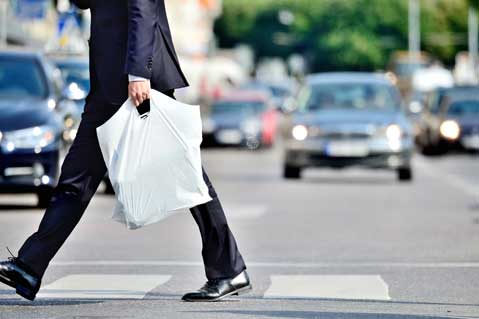June 02, 2016
Massachusetts Senate Passes Bag Ban Provision
The Massachusetts State Senate passed a nearly $40 billion budget bill on May 26 that includes a provision for banning single-use carryout bags at retail establishments. The legislation would require that bags used for carrying purchased items at specific stores need to be reusable or made of recycled paper and sold for at least 10 cents apiece. The ban applies to all retail locations occupying at least 3,000 square feet, or that have at least three locations in the state.

The provision, adopted by a bipartisan 29-9 vote, does not ban produce and dry cleaning bags. Once the final package is complete, after budget negotiations with the Massachusetts House, it goes to Governor Charlie Baker, who will either veto it or sign it into law. The Governor’s office has already voiced apprehension about the ban.
The administration, said Tim Buckley, senior adviser to Baker, “has serious concerns about enacting such a sweeping mandate through the budget process with little to no debate, especially due to the potential impacts on low-income families’ grocery bills, and retailers across Massachusetts.”
The primary sponsor of the ban, Senator James B. Eldridge, a Democrat from Acton, MA, defended the move by stating that single-use plastic bags are used for only an average of 12 minutes, and often wind up as litter. He added that the ban is sensitive to small businesses since it only applies to locations with more than 3,000 square feet, unless they’re part of a chain, and said that more than 30 of the state’s 351 cities and towns have already approved bans. Plastic bags are “something that we really don’t need,” he told the Boston Globe, “given that there are alternatives like a reusable bag or a paper bag.”
Meanwhile, local retail groups are concerned it will negatively affect approximately 20,000 retail locations, including smaller stores already faced with significant competition from e-commerce retailers. Jon B. Hurst, president of the Retailers Association of Massachusetts, called the ban “bad public policy” for both consumers and mom-and-pop stores, and expressed concern that it would take away an advantage that local stores have over online retailers.
“The local store is being put in a position of telling the consumer: ‘Well, you’ve got to pay me to get a bag,’ ” Hurst said. “It’s becoming a bit frightening, this big government, I-know-better-than-you attitude. This is what small-business owners are angry about – all the red tape and everything that is occurring as they try to stay in the black.” Hurst also added that the 10-cent price on checkout bags would be subject to the state’s 6.25% sales tax, what he deems a “tax on a tax.”
Earlier in May, New York’s City Council approved a five-cent fee on single-use plastic and paper bags at grocery and convenient stores, and the Sacramento County Board of Supervisors finalized the approval on a partial ban of single-use plastic bags in late April.
If the proposed ban in Massachusetts survives budget negotiations with the House and is signed into law by the governor, it will go into effect August 1, 2018.

Product Hub
Find the latest in quality products, must-know trends and fresh ideas for upcoming end-buyer campaigns.
